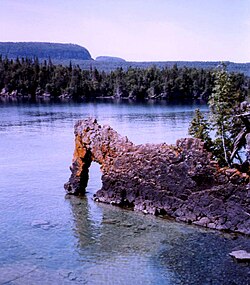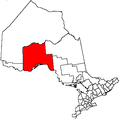| Unorganized Thunder Bay | |
|---|---|
| Unorganized area | |
| Thunder Bay, Unorganized | |
 Sleeping Giant Provincial Park Sleeping Giant Provincial Park | |
 | |
| Coordinates: 50°00′N 88°00′W / 50.000°N 88.000°W / 50.000; -88.000 | |
| Country | Canada |
| Province | Ontario |
| District | Thunder Bay |
| Government | |
| • Federal riding | Algoma—Manitoulin—Kapuskasing Kenora Thunder Bay—Rainy River Thunder Bay—Superior North |
| • Prov. riding | Algoma—Manitoulin Kenora—Rainy River Thunder Bay—Atikokan Thunder Bay—Superior North |
| Area | |
| • Land | 97,009.80 km (37,455.69 sq mi) |
| Population | |
| • Total | 5,872 |
| • Density | 0.1/km (0.3/sq mi) |
| Time zones | |
| East of 90° west | UTC-05:00 (Eastern) |
| • Summer (DST) | UTC-04:00 (EDT) |
| West of 90° west | UTC-06:00 (Central) |
| • Summer (DST) | UTC-05:00 (CDT) |
| Postal Code FSA | P0T |
| Area code | 807 |
Unorganized Thunder Bay District is an unorganized area in northwestern Ontario, Canada in Thunder Bay District. It comprises all parts of the district that are not part of an incorporated municipality or a First Nations reserve.
Most of the territory is within the Eastern Time Zone, but the part west of the 90th meridian is in the Central Time Zone.
Geography
Communities with Local services board
Other communities
- Auden
- Burchell Lake
- Collins
- English River (on boundary with Kenora District)
- Finmark
- Hemlo
- Heron Bay
- Kashabowie
- Nolalu
- Ombabika
- Pays Plat
- Raith
- Savant Lake
- Shabaqua
- Shabaqua Corners
- Silver Islet
- Silver Mountain
- Sorrell Lake
- Suomi
- Upsala
History
Gold was noted in the area since 1869, but it wasn't until Peter Moses from Heron Bay, Ontario discovered additional gold that prospectors flocked to the area. In 1947, Dr. J. Williams and Moses staked 11 claims, which became the Lake Superior Mining Corporation. However, not much development took place until 1979, when Don and David McKinnon, along with John Larche, staked claims in Hemlo and the Manitouwadge area. The Williams Mine started operation in 1985, and produced 445,320 ounces of gold from a 2.45 meter wide ore body. The Golden Giant Mine produced 446,858 ounces in 1994 from a quartz sericite schist host rock. The David Bell Mines produced 204,251 ounces in 1994. The Hemlo gold mines had produced more than 6,000,000 ounces of gold by 1992.
Demographics
Canada census – Thunder Bay, Unorganized community profile| 2016 | 2011 | |
|---|---|---|
| Population | 5872 (-0.6% from 2011) | 5909 (-10.3% from 2006) |
| Land area | 97,009.80 km (37,455.69 sq mi) | 97,007.34 km (37,454.74 sq mi) |
| Population density | 0.1/km (0.26/sq mi) | 0.1/km (0.26/sq mi) |
| Median age | 51.4 (M: 52.0, F: 50.9) | |
| Private dwellings | 6130 (total) | 5782 (total) |
| Median household income | $70,886 |
Population trend:
- Population in 2011: 5909
- Population in 2006: 6585
- Population in 2001: 6223
- Population in 1996: 8460 (or 6534 when adjusted to 2001 boundaries)
- Land area: 105,454.69 square kilometres (40,716.28 sq mi)
- Population in 1991: 8168
Parks in Unorganized Thunder Bay
Provincial parks in Unorganized Thunder Bay include:
- Albany River Provincial Park
- Kopka River Provincial Park
- Neys Provincial Park
- Rainbow Falls Provincial Park
- Sleeping Giant Provincial Park
- Steel River Provincial Park
- Wabakimi Provincial Park
It is also home to one National Park of Canada: Pukaskwa National Park.
Transportation
Via Rail's The Canadian serves the Unorganized Thunder District at the communities of Flindt Landing, Mud River, Ferland, and Auden.
| Current services at Flindt Landing station | ||||
|---|---|---|---|---|
| Preceding station | Following station | |||
| Savant Laketoward Vancouver | The Canadian | Allanwater Bridgetoward Toronto | ||
| Preceding station | Following station | |||
| Current services at Mud River station | ||||
| Armstrongtoward Vancouver | The Canadian | Ferlandtoward Toronto | ||
| Former services at Mud River station | ||||
| Preceding station | Canadian National Railway | Following station | ||
| Willettoward Vancouver | Main Line | Ferlandtoward Montreal | ||
| Current services at Ferland station | ||||
| Preceding station | Following station | |||
| Mud Rivertoward Vancouver | The Canadian | Audentoward Toronto | ||
| Former services at Ferland station | ||||
| Preceding station | Canadian National Railway | Following station | ||
| Mud Rivertoward Vancouver | Main Line | Jackfish Rivertoward Montreal | ||
| Preceding station | Following station | |||
| Current services at Auden station | ||||
| Ferlandtoward Vancouver | The Canadian | Nakinatoward Toronto | ||
See also
- Cobalt silver rush
- Greenstone, Ontario
- List of townships in Ontario
- Matachewan, Ontario
- Porcupine Gold Rush
- Red Lake, Ontario
References
- ^ "Unorganized Thunder Bay District (Code 3558090) Census Profile". 2016 census. Government of Canada - Statistics Canada.
- Barnes, Michael (1995). Gold in Ontario. Erin: The Boston Mills Press. pp. 91–94. ISBN 155046146X.
- "2016 Community Profiles". 2016 Canadian census. Statistics Canada. August 12, 2021. Retrieved 2021-05-12.
- "2011 Community Profiles". 2011 Canadian census. Statistics Canada. March 21, 2019. Retrieved 2012-02-10.
- Statistics Canada: 1996, 2001, 2006 census
- "Flindt Landing train station | VIA Rail". www.viarail.ca. Via Rail. Retrieved 4 November 2024.
- "Mud River train station | VIA Rail". www.viarail.ca. Retrieved 29 March 2024.
- "Ferland train station | VIA Rail". www.viarail.ca.
- "Auden train station | VIA Rail". www.viarail.ca. Retrieved 29 March 2024.
External links
![]() Media related to Unorganized Thunder Bay at Wikimedia Commons
Media related to Unorganized Thunder Bay at Wikimedia Commons
| Places adjacent to Unorganized Thunder Bay District | |
|---|---|
